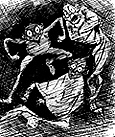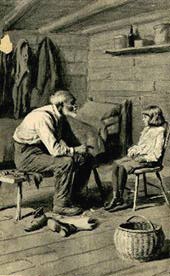

An important connection can be made between Mark Twain, Joel Chandler Harris, and Missouri folklorist Mary Alicia Owen: all three wrote stories in which lore is transmitted from slave or former slave to white child. Early in Huck Finn Huck comments that the slaves were "always talking about witches in the dark by the kitchen fire" (HF, 8.) If this is true, then it is equally true that white children were in the kitchen as well, listening to that talk. In Mark Twain's America, Bernard DeVoto points out that "between a boy and a white man was the barrier of age, but the slave met the boy as an equal, instructing him and sharing with him what the whites denied him because of his age."1 The bond that resulted included a sharing of stories, and through them, beliefs. That these stories and beliefs had their effect cannot be questioned; it is to them that we owe much of what is good in Harris and no small part of what is good in Twain. Years and miles removed from his childhood in Missouri, Twain wrote in his autobiography, "I can hear Uncle Danl telling the immortal tales which Uncle Remus Harris was to gather into his books and charm the world with, by and by" (Autob., 14.)
An example of the equalizing power of this experience occurs in "The Adventures of Simon and Susanna" by Joel Chandler Harris. Uncle Remus begins to relate a story of a man with a beautiful daughter. The little boy immediately asks if the man is white or black. It is a natural query from this character -- his life shows him that white men and black men are very different. Uncle Remus' story, though, does not take place in the realm of the boy's life; he responds, "I'm des tellin' you de tale, en you kin take en take de man en w'itewash 'im, or you kin black 'im up des ez you please. Dat's de way I looks at it."
In Huck Finn, their common beliefs lessen the disparity in position of the white boy and the slave. The world tells Huck that he, as a white, is better than Jim but in the serious matter of Pap's return, Huck defers to Jim's skill with the conjure-ball. On Jackson 's Island, Huck admires Jim's ability to read the signs surrounding them. Huck and Jim are equally at the mercy of the often-malign forces surrounding them. Although powerless in so many ways, Jim has the advantage of being able to read the signs around them.

NOTES:
1. DeVoto, 65. return to text